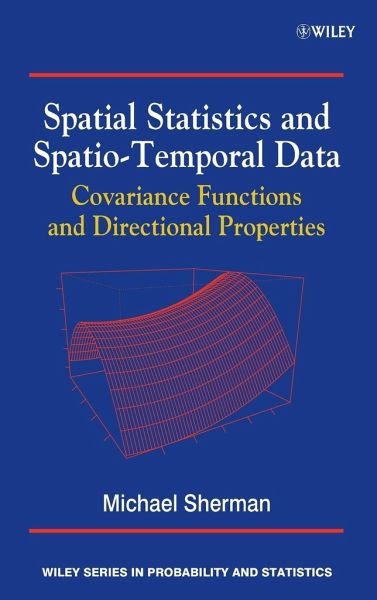
Spatial Statistics and Spatio-Temporal Data
Versandkostenfrei!
Versandfertig in über 4 Wochen
114,99 €
inkl. MwSt.
Weitere Ausgaben:

PAYBACK Punkte
57 °P sammeln!
In the spatial or spatio-temporal context, specifying the correct covariance function is fundamental to obtain efficient predictions, and to understand the underlying physical process of interest. This book focuses on covariance and variogram functions, their role in prediction, and appropriate choice of these functions in applications. Both recent and more established methods are illustrated to assess many common assumptions on these functions, such as, isotropy, separability, symmetry, and intrinsic correlation.After an extensive introduction to spatial methodology, the book details the effe...
In the spatial or spatio-temporal context, specifying the correct covariance function is fundamental to obtain efficient predictions, and to understand the underlying physical process of interest. This book focuses on covariance and variogram functions, their role in prediction, and appropriate choice of these functions in applications. Both recent and more established methods are illustrated to assess many common assumptions on these functions, such as, isotropy, separability, symmetry, and intrinsic correlation.
After an extensive introduction to spatial methodology, the book details the effects of common covariance assumptions and addresses methods to assess the appropriateness of such assumptions for various data structures.
Key features:
An extensive introduction to spatial methodology including a survey of spatial covariance functions and their use in spatial prediction (kriging) is given.
Explores methodology for assessing the appropriateness of assumptions on covariance functions in the spatial, spatio-temporal, multivariate spatial, and point pattern settings.
Provides illustrations of all methods based on data and simulation experiments to demonstrate all methodology and guide to proper usage of all methods.
Presents a brief survey of spatial and spatio-temporal models, highlighting the Gaussian case and the binary data setting, along with the different methodologies for estimation and model fitting for these two data structures.
Discusses models that allow for anisotropic and nonseparable behaviour in covariance functions in the spatial, spatio-temporal and multivariate settings.
Gives an introduction to point pattern models, including testing for randomness, and fitting regular and clustered point patterns. The importance and assessment of isotropy of point patterns is detailed.
Statisticians, researchers, and data analysts working with spatial and space-time data will benefit from this book as well as will graduate students with a background in basic statistics following courses in engineering, quantitative ecology or atmospheric science.
After an extensive introduction to spatial methodology, the book details the effects of common covariance assumptions and addresses methods to assess the appropriateness of such assumptions for various data structures.
Key features:
An extensive introduction to spatial methodology including a survey of spatial covariance functions and their use in spatial prediction (kriging) is given.
Explores methodology for assessing the appropriateness of assumptions on covariance functions in the spatial, spatio-temporal, multivariate spatial, and point pattern settings.
Provides illustrations of all methods based on data and simulation experiments to demonstrate all methodology and guide to proper usage of all methods.
Presents a brief survey of spatial and spatio-temporal models, highlighting the Gaussian case and the binary data setting, along with the different methodologies for estimation and model fitting for these two data structures.
Discusses models that allow for anisotropic and nonseparable behaviour in covariance functions in the spatial, spatio-temporal and multivariate settings.
Gives an introduction to point pattern models, including testing for randomness, and fitting regular and clustered point patterns. The importance and assessment of isotropy of point patterns is detailed.
Statisticians, researchers, and data analysts working with spatial and space-time data will benefit from this book as well as will graduate students with a background in basic statistics following courses in engineering, quantitative ecology or atmospheric science.




